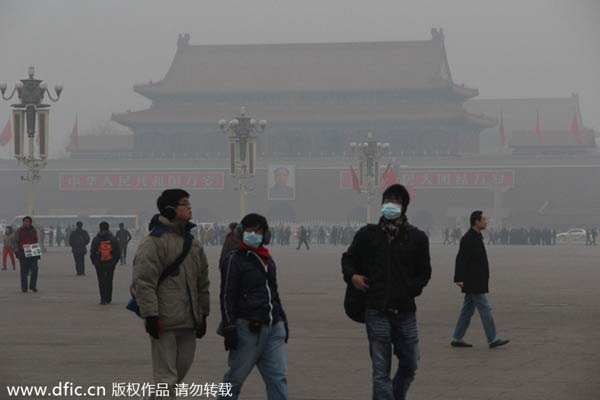 |
|
Tourists wearing face masks visit the Tiananmen Square in heavy smog in Beijing, China, Feb 25, 2014. [Photo/IC] |
The government said on Monday that it had merged Beijing Energy Investment Holding Co and Jingmei Group into a new 200 billion yuan ($32 billion) business in line with its policy to improve efficiency in the energy industry and reduce pollution.
The merger of Beijing Energy and Jingmei, a coal supplier based in the capital, will improve electricity supply, said Lin Fusheng, head of Beijing's Assets Supervision and Administration Commission. He was quoted by the official Xinhua News Agency.
The merger took place on Sunday, Beijing Energy, which invests in electricity projects, said on its website. The new company, Beijing Energy Group Co, will manage coal-fired power plants, renewable energy projects, heating supply and coal mine development, Xinhua reported.
"This is in line with a national plan to combine coal, power and heating resources to boost energy efficiency and cut pollution," said Tian Miao, a Beijing-based analyst with researcher North Square Blue Oak, by phone.
China, the world's biggest energy user, has said it will fight pollution amid record smog levels in cities, including Beijing and Shanghai, which mostly come from coal-fired power plants.
President Xi Jinping, in a pact with US President Barack Obama, agreed to cap China's carbon emissions by 2030 and use renewable sources for 20 percent of the country's energy.
All the three publicly traded units related to the merged companies were suspended from trading on Monday.
Beijing Jingneng Power Co, the power-generation unit of Beijing Energy Investment, gained 2.2 percent to close at 6.46 yuan on Friday. Beih Property Co Ltd, Beijing Energy's property arm, rose 1.8 percent to 6.37 yuan.
Beijing Haohua Energy Resource Co, the unit of Jingmei Group, rose 2.4 percent to 8.91 yuan.
The merged business has assets worth 200 billion yuan, which it aims to increase to 300 billion yuan by the end of 2020, Xinhua said.
Its sales target is 100 billion yuan, compared with 60 billion yuan at present, the report said.
The listed units of the two companies will be used to "consolidate resources", Lin said in the report, which did not give other details.
In China, State-owned companies typically sell assets to their listed units to boost the attractiveness of their stocks.
